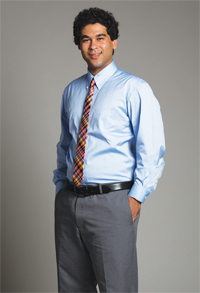Haris Durrani
Senior Applied Physics

Under the direction of Computer Science Professor Peter Allen, Durrani and a team at the Columbia Robotics Lab built a lightweight, inexpensive, brain-controlled robotic arm for people with full-body disabilities. The team was a finalist for the Cornell Cup USA, presented by Intel in Walt Disney World.
Whether it’s pioneering space law, writing science fiction novels, or fighting for the rights of disenfranchised communities, Haris Durrani’s ambitions are as big and bold as his already stellar collection of achievements. His résumé boasts a list of heady accomplishments: award-winning author, editor, Egleston Scholar, cofounder and co-creator of the Muslim Protagonist Symposium, founder of a FIRST Tech Challenge Robotics Team, and the list goes on. Famous authors have lauded his work; he has been published and thrice interviewed on NPR’s The Takeaway. He has received countless awards and honors, including a Creativity and Citizenship Award from the Center for Constitutional Rights and a National Gold Medal Portfolio from Scholastic Art and Writing Awards, and he was named a Minority Undergraduate Physics Major Scholar by the American Physical Society. To amass all this over the course of a lifetime would be duly impressive. But Durrani, a college senior, has not even graduated yet.
Durrani’s passion for engineering and science stems from childhood, beginning with building with LEGOs and playing with science kits. In high school, he established his hometown’s FIRST LEGO League and FIRST Tech Challenge teams in Westport, CT. Within three years he led the teams to first place finishes at the World Championship. He understood the power of robotics.
He knew early on what set engineering apart for him. “Most fields are fascinating in theory,” he says. “Engineering is a field that I love from the meta to the nitty-gritty.”
What is especially impressive about Durrani is his pan-disciplinary thirst for the interesting and his ability to let his various interests inform one another. An applied physics major at the School, Durrani also is a talented writer. He uses literature as an outlet for exploration—a vehicle to contextualize science, engineering, space—and a means to examine his identity as a Dominican, Pakistani American Muslim.
“Literature helped me understand that engineering and science exist in their social contexts and that an understanding of social, political, and moral implications is just as important—if not more important—as engineering formulae and methods.” It was this social consciousness that drew Durrani to Columbia Engineering. “SEAS had an emphasis on social responsibility and humanities that I didn’t see elsewhere,” he says.
Durrani is committed to the pursuit of social justice, and it underlines all he achieves. It was the impetus for his cofounding the Muslim Protagonist Symposium, with Barnard alumna Mirzya Syed, at Columbia to “use literature as an agent of social, intellectual, and spiritual change.” It is also the catalyst for his interest in space law.
Last year, Durrani participated in an independent study with NASA astronaut and Columbia Engineering professor Michael Massimino BS’84, where he investigated the political and legal implications related to space debris and policy. “I believe that if we invest the time in forming the law now, we can make sure the final frontier is a feasible one. It’s a field that I feel I can go into, helping to form its paradigms rather than merely improving what has already been done before.” For Durrani, who is by nature a builder, whether of robots or of stories, being able to craft something from its infancy has always been an attractive prospect.
Fittingly, what’s exciting to Durrani about his future isn’t the realization of one particular goal but the sum force of all his passions being realized.
Sharing a quote of one of his favorite authors, fellow Columbian Isaac Asimov, Durrani says, “Knowledge is indivisible. When people grow wise in one direction, they are sure to make it easier for themselves to grow wise in other directions as well.” Indeed, Durrani embodies this principle by looking for the connectivity in all he pursues.
